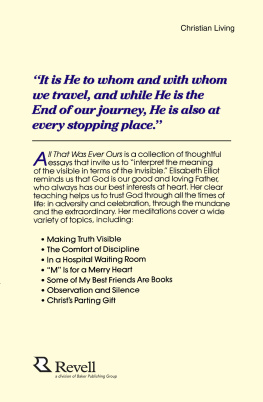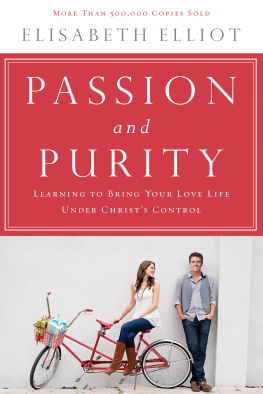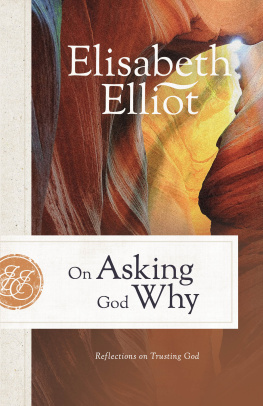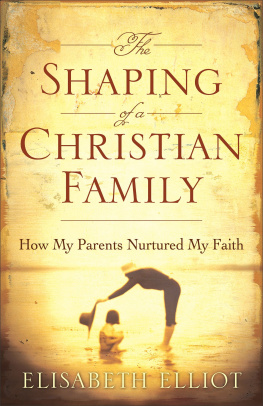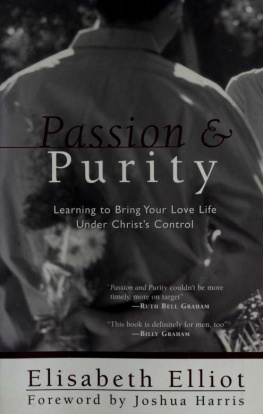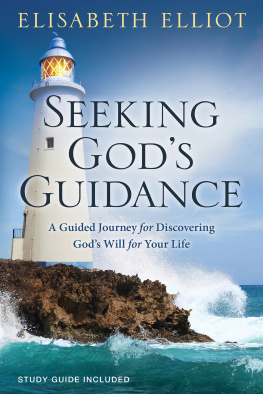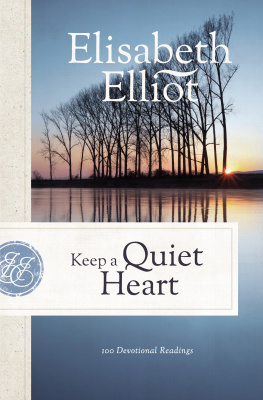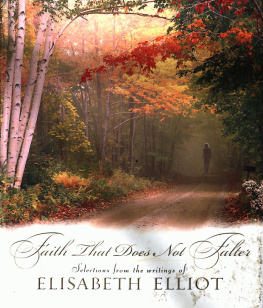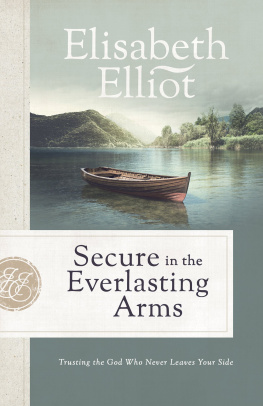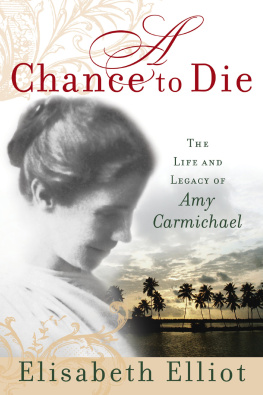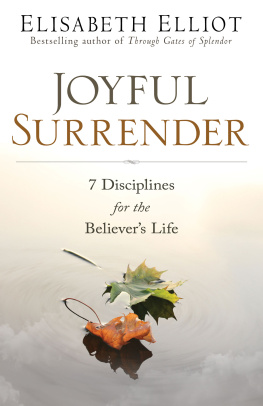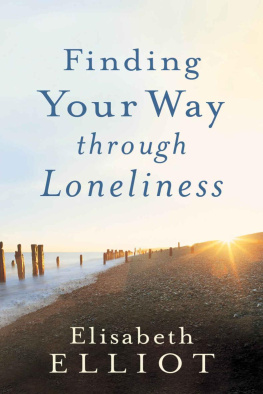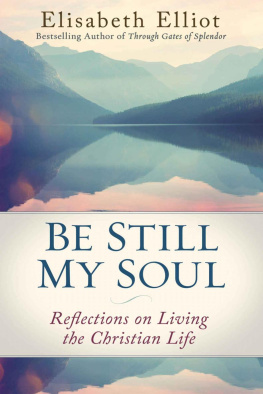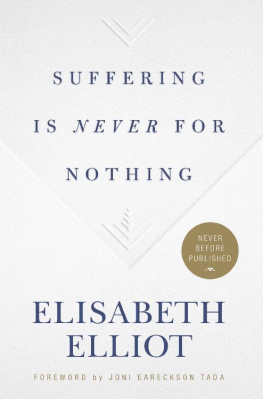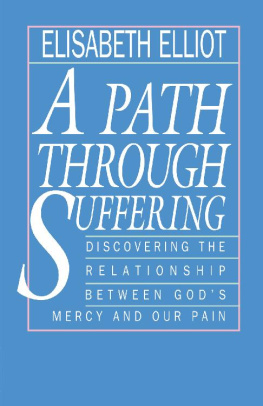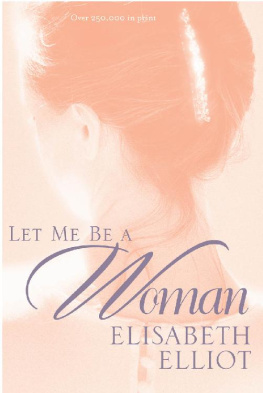Elisabeth Elliot - All That Was Ever Ours
Here you can read online Elisabeth Elliot - All That Was Ever Ours full text of the book (entire story) in english for free. Download pdf and epub, get meaning, cover and reviews about this ebook. year: 2021, publisher: Baker Publishing Group, genre: Detective and thriller. Description of the work, (preface) as well as reviews are available. Best literature library LitArk.com created for fans of good reading and offers a wide selection of genres:
Romance novel
Science fiction
Adventure
Detective
Science
History
Home and family
Prose
Art
Politics
Computer
Non-fiction
Religion
Business
Children
Humor
Choose a favorite category and find really read worthwhile books. Enjoy immersion in the world of imagination, feel the emotions of the characters or learn something new for yourself, make an fascinating discovery.
- Book:All That Was Ever Ours
- Author:
- Publisher:Baker Publishing Group
- Genre:
- Year:2021
- Rating:4 / 5
- Favourites:Add to favourites
- Your mark:
- 80
- 1
- 2
- 3
- 4
- 5
All That Was Ever Ours: summary, description and annotation
We offer to read an annotation, description, summary or preface (depends on what the author of the book "All That Was Ever Ours" wrote himself). If you haven't found the necessary information about the book — write in the comments, we will try to find it.
All That Was Ever Ours — read online for free the complete book (whole text) full work
Below is the text of the book, divided by pages. System saving the place of the last page read, allows you to conveniently read the book "All That Was Ever Ours" online for free, without having to search again every time where you left off. Put a bookmark, and you can go to the page where you finished reading at any time.
Font size:
Interval:
Bookmark:
Other Books by Elisabeth Elliot
Through Gates of Splendor
Shadow of the Almighty
Love Has a Price Tag
Discipline: The Glad Surrender
Passion and Purity
A Lamp for My Feet
The Savage My Kinsman
These Strange Ashes
The Mark of a Man
Let Me Be a Woman
A Chance to Die
Copyright 1988 by Elisabeth Elliot
Published by Revell
a division of Baker Publishing Group
P.O. Box 6287, Grand Rapids, MI 49516-6287
www.revellbooks.com
Ebook edition created 2021
All rights reserved. No part of this publication may be reproduced, stored in a retrieval system, or transmitted in any form or by any meanselectronic, mechanical, photocopy, recording, or any otherexcept for brief quotations in printed reviews, without the prior permission of the publisher.
Library of Congress Cataloging-in-Publication Data is on file at the Library of Congress, Washington, DC.
ISBN 978-1-4934-3446-6
Scripture quotations identified NEB are from the New English Bible. Copyright The Delegates of the Oxford University Press and the Syndics of the Cambridge University Press 1961, 1970. Reprinted by permission.
Scripture quotations identified PHILLIPS are from THE NEW TESTAMENT IN MODERN ENGLISH, Revised EditionJ. B. Phillips, translator. J. B. Phillips 1958, 1960, 1972. Used by permission of Macmillan Publishing Co., Inc.
Scripture quotation identified RSV is from the Revised Standard Version of the Bible, Copyrighted 1946, 1952, 1971, by the Division of Christian Education of the National Council of the Churches of Christ in the United States of America, and is used by permission. All rights reserved.
Some of the essays in this volume appeared earlier under the title Twelve Baskets of Crumbs.
In spite of strong movements in the past few decades, I suspect that what an editor told Dorothy Sayers half a century ago in Britain may apply even now in America: Our public do not want to be admonished by a woman.
Most of the time I dont want to be admonished by anybody. Id rather just do what feels good without being told it isnt a good thing to do. When people ask how I feel about an issue, it would be easier simply to answer the question instead of getting down to brass tacks and trying to think about it. I find that my feelings generally change after Ive thought about something, and even if they dont Im convinced that thinking rather than feeling should determine my actions.
Here are essays on great themesHope, Truth, Freedom, and such. There are essays on lesser themesnostalgia, boredom, spontaneity. They rise from the everyday life of one individual who tries to see things, to understand things, to learn from them.
I try to interpret the meaning of the visible in terms of the Invisible, for it is on that level that all things find their ultimate meaning. As a Christian I believe that all my problems are theological onesthat is, that all have meaning on a level much higher than the level on which I live my life. This idea, of course, is anything but new. It is what Christians have always believed, but many of us do not always live and act as though we believe it. I remember once asking somebody whether he believed a certain thing. Not specially, was his answer.
I am trying to believe speciallyin a way, that is, that radically affects everything I do every day of every week. It does make a difference to me that the God who created, names, and numbers the stars in the heavens also numbers the hairs of my head. Such a triviality! I drop quite a few of them in the wastebasket every morningbut God counts them. It makes a difference to me that the God who ordained (which means set in place) the sun, the moon, and all the galaxies, also ordained a wormto teach a prophet a lesson. He pays attention to very big things and to very small ones. What matters to me matters to Him, and that changes my life.
You can throw the whole weight of your anxieties upon him, for you are his personal possession, wrote St. Peter, a man who knew quite a bit about anxieties.
The writer to the Hebrew Christians reminded them of Old Testament times when the people of God had a tabernacle in the wilderness, a holy place in this world for the eternal God (Hebrews 9:1 PHILLIPS). He mentioned ordinary thingsa lamp, a table, loaves of bread, curtainsand extraordinary things: a golden altar and an ark, the cherubim of glory, the mercy seat. But all were visible and tangible, and all were full of meaning.
My house, my kitchen, my desk, my very body are meant to be holy places in this world for the eternal God. It is from this vantage point that I write.
Because the pieces were written over a period of years, there are occasional irregularitiesinevitable repetitions, and the use of tenses which no longer apply, for example when I speak of my mother in the present tense, although she died in 1987. I have made no attempt to expunge or alter these.

A Talk Given at the Urbana Student Missionary Convention, 1979.
More than twenty-three years ago I was living in a small thatch-roofed house in a small jungle clearing on a small river called the Tiwaenu in the small country of Ecuador. An ordinary day would begin anywhere from three oclock till five or so in the morning. The low crooning of an Auca song would often fit into my dreams for a while before I wakened and then, gradually, I would come to, and hear the Indians, still in their hammocks in the houses around the clearing, singing their strange two-or at most three-note songs:
Waenoni baronki iunae....
I have counted as many as seventy repetitions of verse one, but then, before you lose your mind, they go on to verse two:
MiH baronanai aemumae....
While they were singing I could hear the pat-pat-pat of feather fans as the women fanned the fires, and then the soft cracking sound as they tapped manioc with a stick, peeled and split it in preparation for cooking. They would push the glowing log-tips together, set their clay pots on top, and I would hear the pfff-pfff as they blew on the fire. Roosters would crow, the fanning and the songs would go on, and as dawn broke behind the tall trees I would give up pretending to be asleep. I would open my eyes and the two teen-aged boys who slept in the house next door (our houses had no walls) would belt out the first announcement of the day: Baru! ani omaemunamba! which means, Shes awake!
I was a freak to these people. They were the Auca Indians of the Ecuadorian rain forest, a people so isolated that most of them had never laid eyes on anybody they didnt know, so primitive they still made fire with two sticks. They wore no clothes at all, only a piece of cotton string around the hips. When I asked what the string was for they looked at me horrified. Well, you certainly wouldnt expect us to go around naked, would you? They had a notion from way backnobody could tell me where they got itthat everybody in the world who wasnt an Auca was a cannibal, so when they met up with strangers they usually dispatched them as quickly as possible with eight-foot wooden spears to avoid ending up in the strangers cooking pot.
One day, two years before I lived there, the Aucas had found five white men on a little strip of sand on the Curaray River, men who had been dropping gifts to them from a yellow airplane. The Indians called the plane ibu, meaning bumblebee, because the sound it made was almost identical. They had argued among themselves for a long time about whether these men might be as friendly as they appeared to be, shouting and gesticulating from the plane, or whether they were just masters of treachery and deception. They couldnt possibly know that they were missionaries, bent only on giving them some very good news. When they finally found themselves face to face on the sandstrip, the Indians hesitated, uncertain as to what to do. At last, the oldest of the six men, a man whom I later got to know as Gikita, said, Well, I brought my spearbutu Wati! taenumu waeninani yaeaeIm going to kill them, and with that he lunged across the river that separated them and sank his weapon into the back of one of the missionaries. A long fight ensued, but ended with all five of the Americans dead.
Next pageFont size:
Interval:
Bookmark:
Similar books «All That Was Ever Ours»
Look at similar books to All That Was Ever Ours. We have selected literature similar in name and meaning in the hope of providing readers with more options to find new, interesting, not yet read works.
Discussion, reviews of the book All That Was Ever Ours and just readers' own opinions. Leave your comments, write what you think about the work, its meaning or the main characters. Specify what exactly you liked and what you didn't like, and why you think so.

